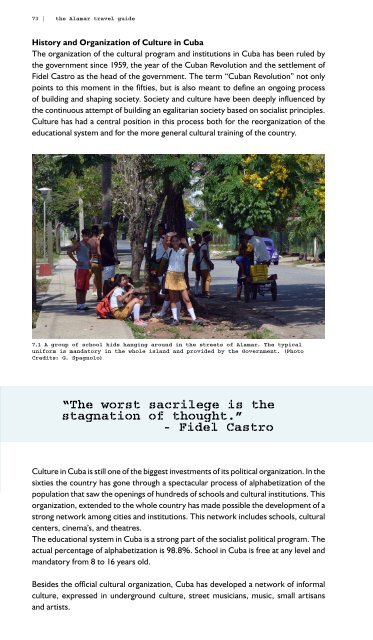Create successful ePaper yourself
Turn your PDF publications into a flip-book with our unique Google optimized e-Paper software.
73 | the <strong>Alamar</strong> travel guide<br />
History and Organization of Culture in Cuba<br />
The organization of the cultural program and institutions in Cuba has been ruled by<br />
the government since 1959, the year of the Cuban Revolution and the settlement of<br />
Fidel Castro as the head of the government. The term “Cuban Revolution” not only<br />
points to this moment in the fifties, but is also meant to define an ongoing process<br />
of building and shaping society. Society and culture have been deeply influenced by<br />
the continuous attempt of building an egalitarian society based on socialist principles.<br />
Culture has had a central position in this process both for the reorganization of the<br />
educational system and for the more general cultural training of the country.<br />
7.1 A group of school kids hanging around in the streets of <strong>Alamar</strong>. The typical<br />
uniform is mandatory in the whole island and provided by the Government. (Photo<br />
Credits: G. Spagnolo)<br />
“The worst sacrilege is the<br />
stagnation of thought.”<br />
- Fidel Castro<br />
Culture in Cuba is still one of the biggest investments of its political organization. In the<br />
sixties the country has gone through a spectacular process of alphabetization of the<br />
population that saw the openings of hundreds of schools and cultural institutions. This<br />
organization, extended to the whole country has made possible the development of a<br />
strong network among cities and institutions. This network includes schools, cultural<br />
centers, cinema’s, and theatres.<br />
The educational system in Cuba is a strong part of the socialist political program. The<br />
actual percentage of alphabetization is 98.8%. School in Cuba is free at any level and<br />
mandatory from 8 to 16 years old.<br />
Besides the official cultural organization, Cuba has developed a network of informal<br />
culture, expressed in underground culture, street musicians, music, small artisans<br />
and artists.




